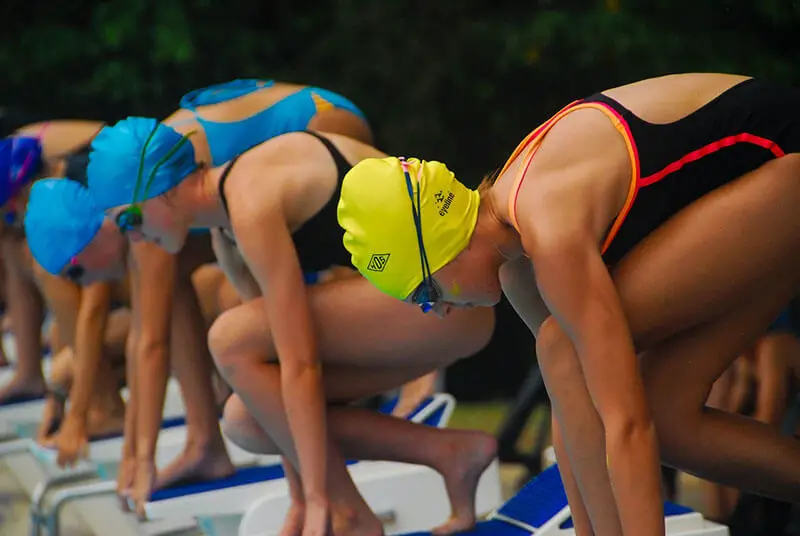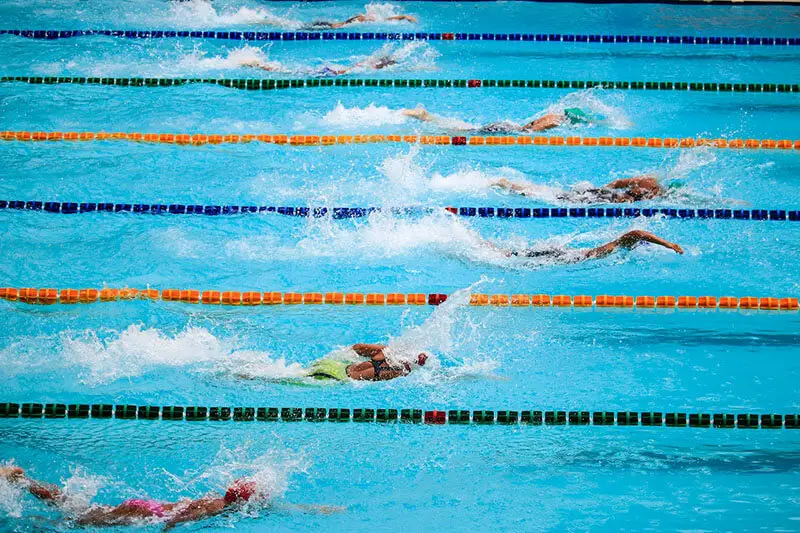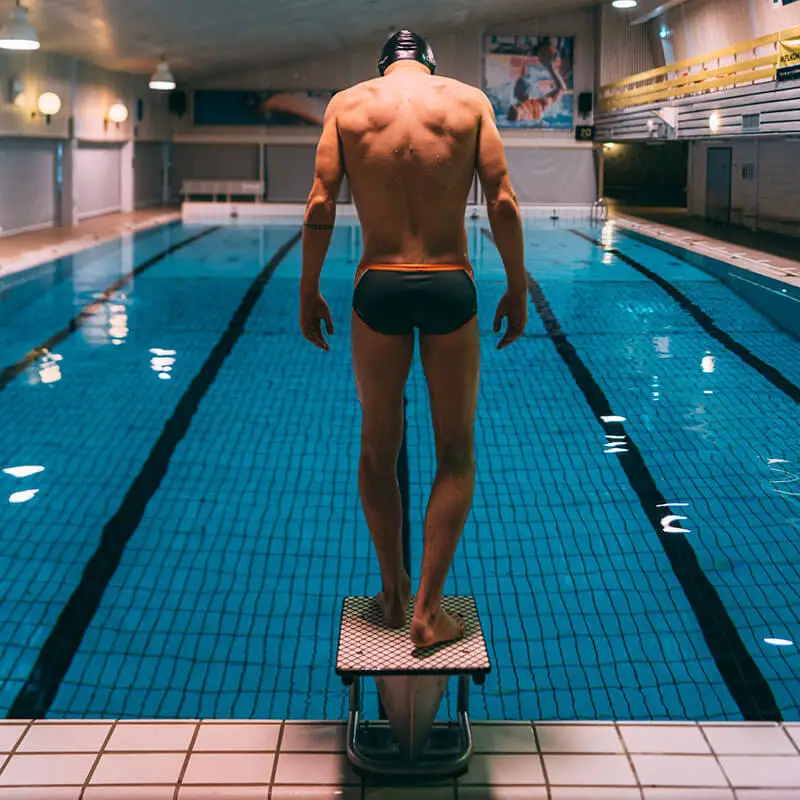Runners aspire to achieve the fabled four-minute mile, a feat few have accomplished and most thought was impossible prior to its achievement in 1954.
When it comes to swimming, a comparable feat would be something like swimming a mile in under 20 minutes. Just to be clear, that is approaching world class levels of speed considering even advanced swimmers will probably never break this barrier.
How fast one takes to swim a mile depends on various factors such as age, gender, and swimming ability, indoors vs outdoors, and swim stroke. Generally speaking, it should take a beginner around 45-50 minutes or more to swim a mile, an experienced swimmer may take around 35-40 minutes, an advanced swimmer can do it in under 30 minutes, and an expert swimmer can do it in under 20 minutes.
There are many variables that can affect how long it takes you to swim a mile, and in this article I will go over them to give you the most accurate times for someone to swim a mile.
What’s so special about swimming a mile in X amount of time?
This test of swimming ability is obviously very important to many people judging by how many are asking questions like how many laps it takes to swim a mile in a 25 yard pool or a 25 meter pool.
By knowing that it takes 70.4 laps to swim a mile in a 25 yard pool and 64.4 laps in a 25 meter pool, swimmers can better prepare themselves mentally and physically for this challenge.
If they want to swim a mile under a certain time, then they can use this information to calculate how fast their pace should be per lap at a minimum so that they don’t fade near the end.
It can give swimmers a clear goal to work towards and can help them quickly gauge their swimming ability relative to others.
Swimming a mile in a respectable time is like a rite of passage for the more competitive swimmers and is yet another swim time they can flaunt and compare with others. It’s also a darn good workout.
Factors that affect how long it takes to swim a mile

If you’re wondering what a “good” time is to swim a mile, that depends on a lot of things.
How old are you? Swimming a mile in, say, 50 minutes is probably nothing special to most young and healthy swimmers. It’s absolutely amazing if you’re 90-years old. Age is beneficial up to a point (20-30), but after that performance starts to suffer.
What swim stroke are you using? Front crawl/freestyle is the fastest stroke, butterfly is comparable in speed but is more tiring, next in speed is backstroke, and breaststroke is the slowest. Unless you want to compare times across different strokes, I suggest just swimming freestyle for the fastest time.
How much swimming experience do you have? Assuming you are not over the age of 30, generally speaking the longer you’ve been swimming for, the better your time will be relative to someone younger.
Are you male or female? Men will have faster times than women because they are physically stronger, generally taller, and can generate more velocity per stroke and kick. Women are not that far behind, however.
Are you swimming in a SCY, SCM, or LCM pool? Shorter pool lengths, such as short course yard pools (25-yards) and short course meter pools (25-meters) are going to result in faster times than a long course meter pool (50-meters). This is because you can turn and kick off the walls twice as often compared to an LCM pool which can give you a boost in speed.
Are you swimming indoors or outdoors? Swimming outdoors introduces a whole new set of factors such as weather conditions, water temperature, direction of the water current, and the inability to kick off a pool wall. You should expect swimming a mile outdoors to generally take longer than indoors because it’s harder.
Do you have the right body type? Some people were born to swim. They are tall, have long arms, long torsos, short legs, huge hands and feet, and are lean and muscular. The closer your body type is to the ideal swimmer’s body, the better your swim times will be.
Average mile swim times by age and ability
The data provided below was taken from this article.
Average 1-mile swim times by age and ability for men
| Age | Beginner | Novice | Intermediate | Advanced | Elite |
| 10 | 59:37 | 47:32 | 37:28 | 29:33 | 23:33 |
| 15 | 51:36 | 41:08 | 32:26 | 25:34 | 20:23 |
| 20 | 49:51 | 39:44 | 31:20 | 24:43 | 19:42 |
| 25 | 49:51 | 39:44 | 31:20 | 24:43 | 19:42 |
| 30 | 49:54 | 39:46 | 31:22 | 24:44 | 19:43 |
| 35 | 50:43 | 40:25 | 31:52 | 25:08 | 20:02 |
| 40 | 52:28 | 41:49 | 32:59 | 26:00 | 20:44 |
| 45 | 54:26 | 43:24 | 34:13 | 26:59 | 21:30 |
| 50 | 56:34 | 45:06 | 35:33 | 28:02 | 22:21 |
| 55 | 58:53 | 46:56 | 37:00 | 29:11 | 23:16 |
| 60 | 01:01:23 | 48:55 | 38:35 | 30:25 | 24:15 |
| 65 | 01:04:06 | 51:06 | 40:17 | 31:46 | 25:19 |
| 70 | 01:07:19 | 53:40 | 42:19 | 33:22 | 26:36 |
| 75 | 01:12:20 | 57:39 | 45:28 | 35:51 | 28:34 |
| 80 | 01:20:03 | 01:03:49 | 50:19 | 39:40 | 31:37 |
| 85 | 01:32:09 | 01:13:28 | 57:55 | 45:40 | 36:24 |
| 90 | 01:52:17 | 01:29:30 | 01:10:35 | 55:39 | 44:22 |
Average 1-mile swim times by age and ability for women
| Age | Beginner | Novice | Intermediate | Advanced | Elite |
| 10 | 59:52 | 48:54 | 39:34 | 32:01 | 26:09 |
| 15 | 53:44 | 43:54 | 35:31 | 28:44 | 23:29 |
| 20 | 51:09 | 41:47 | 33:49 | 27:21 | 22:21 |
| 25 | 51:09 | 41:47 | 33:49 | 27:21 | 22:21 |
| 30 | 51:09 | 41:47 | 33:49 | 27:21 | 22:21 |
| 35 | 51:29 | 42:04 | 34:02 | 27:32 | 22:30 |
| 40 | 52:33 | 42:56 | 34:44 | 28:06 | 22:58 |
| 45 | 54:26 | 44:28 | 35:59 | 29:07 | 23:47 |
| 50 | 57:14 | 46:46 | 37:50 | 30:37 | 25:00 |
| 55 | 01:00:32 | 49:27 | 40:01 | 32:22 | 26:27 |
| 60 | 01:04:13 | 52:28 | 42:27 | 34:20 | 28:03 |
| 65 | 01:08:23 | 55:52 | 45:12 | 36:34 | 29:53 |
| 70 | 01:13:08 | 59:44 | 48:20 | 39:07 | 31:57 |
| 75 | 01:18:35 | 01:04:12 | 51:57 | 42:02 | 34:20 |
| 80 | 01:25:04 | 01:09:30 | 56:14 | 45:30 | 37:10 |
| 85 | 01:35:47 | 01:18:15 | 01:03:19 | 51:14 | 41:51 |
| 90 | 01:55:27 | 01:34:19 | 01:16:18 | 01:01:44 | 50:26 |
How to calculate your own mile swim time
If you feel that the data provided in the tables above are not accurate, then you can easily do your own calculations.
Knowing that it takes 70.4 laps to swim a mile in a 25 yard pool and 64.4 laps in a 25 meter pool, you can estimate how long it takes someone to swim a mile if you know their average lap time.
For example, if it takes someone on average 40 seconds to swim a lap in a 25-yard pool, then we can multiply 40 seconds by 70.4 laps to get 2816 seconds to swim a mile, or nearly 47 minutes.
This is assuming they are maintaining that pace for the entire time, but it’s probably more realistic to assume they may take 10-20% longer as they fatigue and slow down or start resting between laps.
You can easily pull data from swim meets and do your own calculations to see other swimmers’ paces, and how long they might take to swim a mile.
What is a good mile swim time?

Using the data provided in the tables above, a good swim time would be maintaining a swimming pace matching the times in the advanced to expert columns.
If you can swim the entire time with minimal to no rest between laps at a solid pace, then your time will likely be good.
To give a more concrete number, if you can swim a mile in under 30 minutes, that’s already considered pretty good. If you can do it in under 20, then that’s amazing. Anything better than that and you’d be around the level of an Olympic finalist.
How long does it take to swim a mile in open water?
Swimming in open water such as in the ocean is going to take longer than swimming indoors, that’s for sure.
When swimming outdoors, you will have to contend with external variables that are always changing such as the direction of the water currents, waves, changes in water temperature, and so on.
Another major difference is that there are no walls for you to turn and kick off from, so that can slow you down even further.
For these reasons, I would take the one mile swim times provided in the tables above, and increase the time by 10-20% to account for these extra variables.
How long does it take to swim 2 miles?
Determining how long it takes to swim two miles is not the same as taking one’s one mile swim time and then doubling it.
Swimming this kind of distance is the kind of stuff triathletes do and requires one to have immense stamina and endurance – both mental and physical.
There is already a lot of real world data for us to get a good estimate. For example, in Ironman triathlons, the swimming portion is 2.4 miles long.
The average triathlete completes the open water swimming portion in roughly 80 minutes without stopping. Since this is an Ironman, competitors are conserving their energy for the bike ride and marathon run after.
If you want to attempt a 2-mile swim, your conditions will likely be more favorable. You would only swim 2 miles instead of 2.4, you would probably be swimming indoors, and you probably aren’t planning on running and biking afterwards so you don’t have to conserve as much energy.
However, if your endurance isn’t good enough, you will likely start to slow your pace or take long breaks between laps. So you could take your one mile swim time, double it, and expect to take another 10-20% longer or possibly even more.
A good time for this would be around 50-60 minutes for an advanced swimmer. For a novice to intermediate level swimmer, it can take around 90 minutes or more, if they can even finish it.

